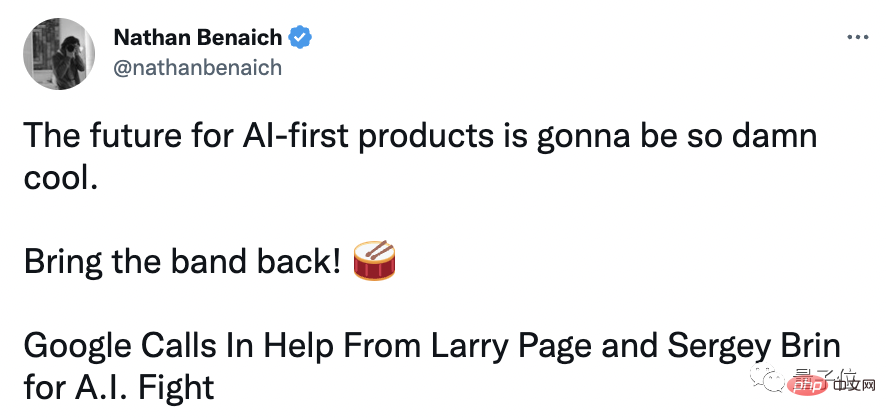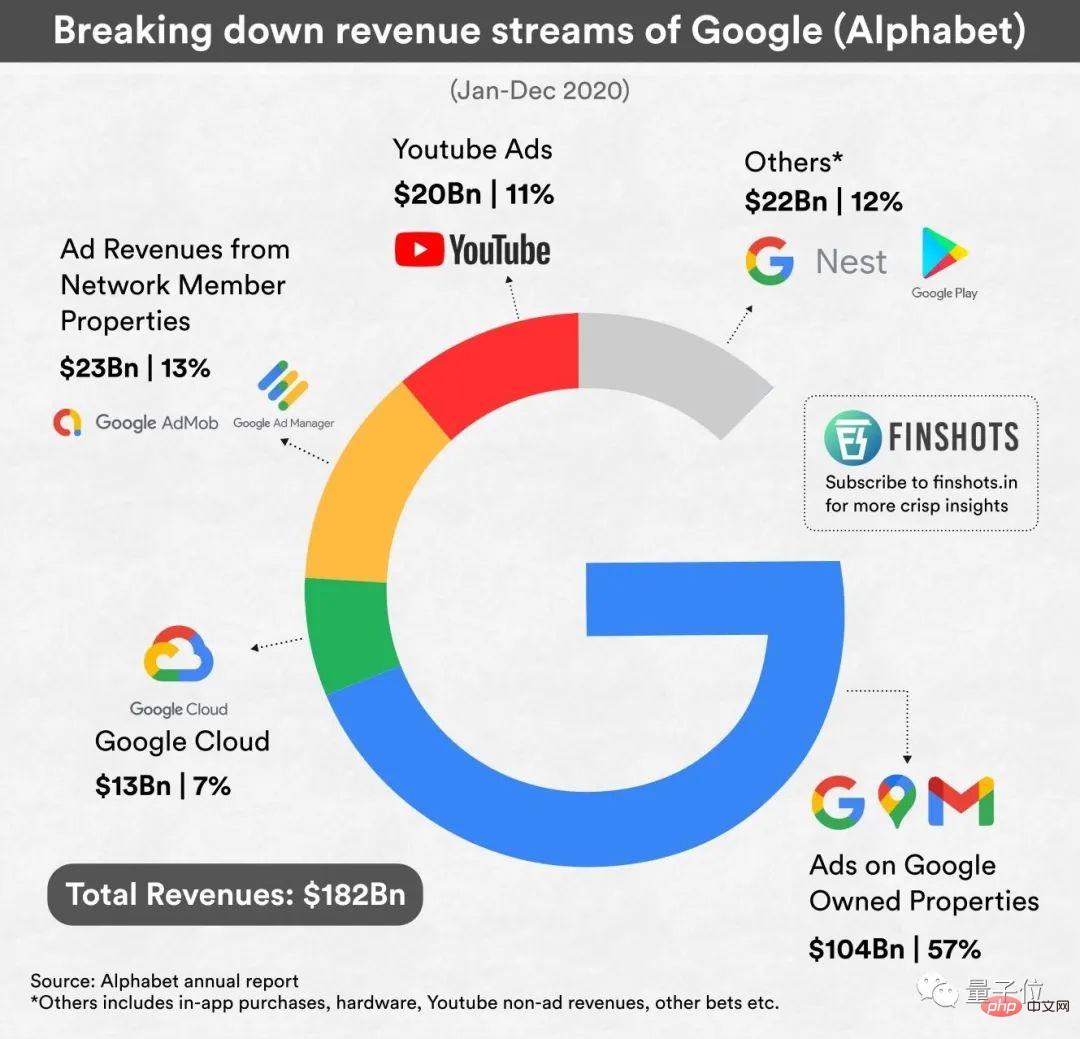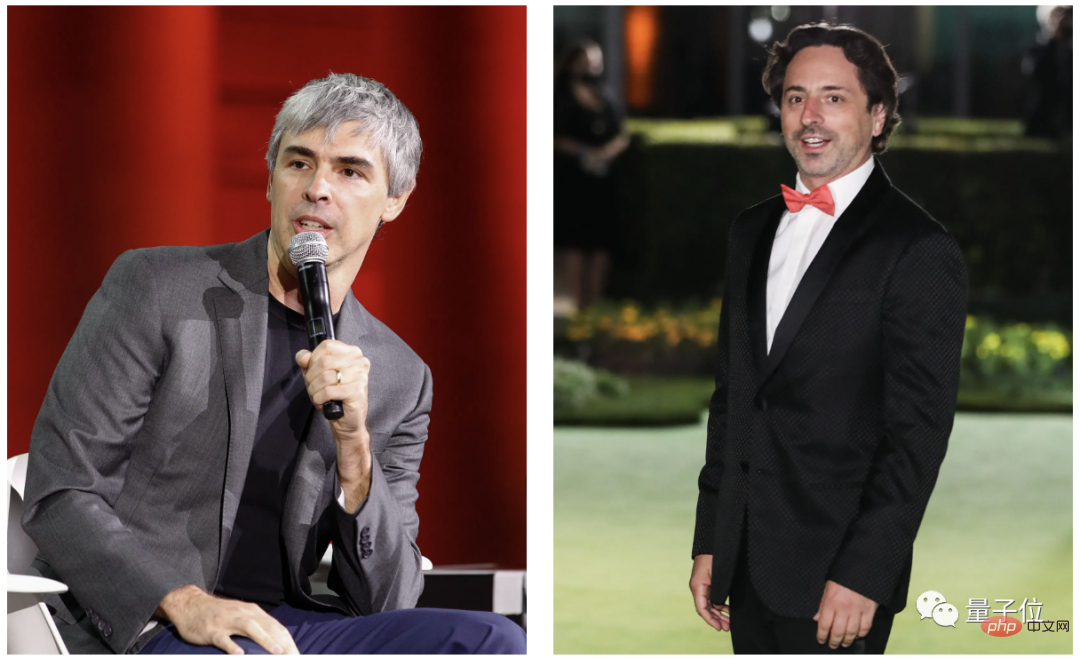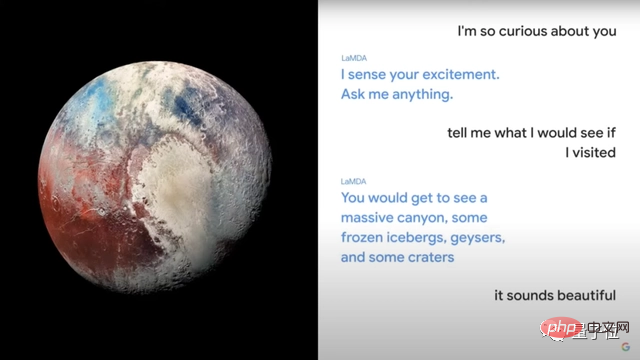 Technology peripherals
Technology peripherals
 AI
AI
 Google is really confused by ChatGPT! The two founders urgently returned to formulate strategies, and the foundation of search advertising cannot be lost.
Google is really confused by ChatGPT! The two founders urgently returned to formulate strategies, and the foundation of search advertising cannot be lost.
Google is really confused by ChatGPT! The two founders urgently returned to formulate strategies, and the foundation of search advertising cannot be lost.
This article is reprinted with the authorization of AI New Media Qubit (Public Account ID: QbitAI). Please contact the source for reprinting."
Google is really panicking.
Throttling: 12,000 people Workers were laid off at the end of the new year, and now it is revealed that they have formulated a defensive strategy:
and urgently summoned the two founders.
△ Google founder Page ( Pictured on the left) and Brin (pictured on the right)
Just as Microsoft is preparing to integrate ChatGPT in its own products, last month, Google founders Larry Page and Sergey Brin discussed ChatGPT’s A fierce offensive was held, and many high-level meetings were held.
You must know that in the past three years, although Page and Brin still hold important positions on the board of directors, they have resigned from specific operational management positions at Google - in other words, Just quit the front line.
Once the incident of the two people attending the meeting and the theme of the meeting broke out, it undoubtedly sent a signal to the outside world:
Google may have really reached the point of "critical survival" Pass.
It was revealed that the main topic of the two founders’ meetings revolved around “chat robot search engine”, and they approved and proposed a plan to further integrate conversational AI and search engines.
The next step in the response strategy deployed by Google is to launch 20 new AI products within the year.
Google is really panicking
Google’s old rival Microsoft is launching a fierce offensive with OpenAI. No one Unexpectedly, on an ordinary day at the end of November last year, ChatGPT was born with overwhelming momentum.
In the debate of "Will ChatGPT replace Google?", whether the east wind prevails over the west wind, or the opposite is true, Google I have my own account in my heart.
After sounding the red alert, it is now revealed that the two founding masters held a high-level meeting on the "chat robot search engine".
The critical survival is evident. .
After all, Page and Brin have stepped down from specific operational management positions since 2019, and have publicly withdrawn from Google’s daily work.
Since then, in the eyes of the outside world, the two founders have been very critical of Google. Its development path has always adopted a laissez-faire attitude.
Let Sundar Picha serve as the CEO of Google and its parent company Alphabet. He will either start a flying car startup or participate in emergency and disaster relief work.
According to people familiar with the matter, during the more than three years of "retirement", Page and Brin occasionally appeared at Alphabet's offices in Silicon Valley, mainly to learn about what Alphabet calls "other bets" )" moonshot plan.
Even in recent times, they have not been too distracted by search engine work.
But it is different now.
Compared with Pichai's email "having to make a difficult decision" and laying off 12,000 employees with a wave of his hand, Page and Brin's participation in high-level meetings less than two weeks after their ChatGPT debut seemed to highlight Google's panic.
Attendees included Jeff Dean, Google’s senior vice president of research and AI, and Kent Walker, Google’s president of global affairs and chief legal officer.
The specific discussions discussed in these high-level meetings are as follows:
First, review Google’s AI strategy.
The two founders have always been eager to introduce AI into Google products, including the acquisition of AI laboratory DeepMind in 2014.
And one of the meanings of the name of the parent company Alphabet is exactly alpha-bet (alpha is the investment return under excess returns, and today, it is AI).
Second, evaluate next product plans, which will debut at the I/O conference in May.
The most eye-catching thing is the approval of plans and suggestions to add more chatbot functions to the Google search engine.
Senior executives have followed their advice and put AI at the top of the company’s strategic plans.
The founder of Google who has withdrawn from the front line attaches great importance to the current situation, which has made many people look forward to it.
For example, this investor applauded:
I hope to return to the golden age of Google!

Where does the threat come from?
The leader of search engines, a search business worth US$149 billion, has to face the huge threat from ChatGPT head-on decades after its establishment.
The core capital of Google’s long-term dominance is that it can provide users with the answers they want very quickly, far exceeding its competitors.
ChatGPT, which poses a threat this time, seems to provide a new way to search for information on the Internet in the form of conversations. It will also be integrated into all Microsoft products and serve as a platform for other companies to use. .
But if we just talk about the search engine that integrates large language models, Google itself is not unprepared.
For example, Google has already deployed the dialogue system LaMDA in its products.
Then, what is it panicking about?
△LaMDA plays the role of Pluto and has a dialogue with users
In the final analysis, it is nothing more than the impact that ChatGPT brings to Google’s core business and business model Fundamental impact.
Let’s take a look at the core business search engine first.
The emergence of ChatGPT is actually nothing new. The basic model behind it, GPT3/GPT3.5, has been around for a long time. And although it has not been publicly released, Google's engineers are holding on to the large language model (LLM) PaLM, which is not without capabilities.
However, when LaMDA was unveiled last year, almost no one was discussing its alternative to search engines.
But after ChatGPT lets people experience the best conversational robot ever, everything is different.
In addition, ChatGPT’s ability to generate content in seconds and its almost zero generation cost are enough to fill the entire Internet with the content it generates that is difficult to distinguish between true and false.
As a result, the content presented to users by Google’s most core search engine will also be overwhelmed by “junk content” that is not reliable or not.
Furthermore, according to Felts founder Can Duruk, as long as the desired results are found in the end, most people don’t care whether they are “cheated” by content of questionable authenticity during the search process.
ChatGPT may tell you that the capital of Turkey is Ankara, but in fact I believe that the vast majority of Americans do not know where the capital of Turkey is...
Moreover, many people query things It doesn't require such strong timeliness.
ChatGPT may not be able to tell you who the 2022 World Cup champion is, but it can easily tell you how to make Kung Pao Chicken, a long-standing dish.
Let’s talk about ChatGPT’s impact on Google’s business model.
There is no doubt that advertising business is the core of Google’s revenue.
Whether it is search page ranking or advertising interface, the existence of advertising slots makes Google a lot of money.
In 2021 alone, the advertising business earned Google $208 billion, accounting for 81% of Alphabet’s total revenue.

However, conversational AI like ChatGPT does not provide a place for advertisements at all.
Sridhar Ramaswamy, the former head of the Google advertising team, said that if ChatGPT remains popular for a while, users will no longer favor Google links with hidden advertising Easter eggs.
At the same time, it is hard to imagine that when you want to ask "Where is the office address of Science and Technology Qubit", the conversational AI robot will first tell you a story about McDonald's Crazy Thursday.
More importantly, even if Google really launches ChatGPT and opens its chatbot search engine to the outside world, it will subvert its current business model.
In short, ChatGPT introduces search engine functions, which is a big step towards complete functions, enhanced timeliness and accuracy for ChatGPT.
OpenAI’s ChatGPT plus Microsoft Bing, if the two really join forces, the functionality improvement will be huge.
However, for Google, commercializing conversational AI and integrating it into the search engine seems to be a thankless task.
But in this situation, Google had to bite the bullet and develop a "chat robot search engine" that can compete with ChatGPT while ensuring that its advertising revenue is not affected.
One More Thing
Looking at the many technology giants in the United States, Zuckerberg is the only founder who is personally on the front line.
Before Google, it was not uncommon for founders to return in difficult times and try to save the company from danger. Jack, the founder of Twitter, Page of Google, and Steve Jobs of Apple have all done this before.
The trend of founders returning to business is also popular in China, such as Ma Huateng.
I wonder if this wind will blow violently towards Silicon Valley?
The above is the detailed content of Google is really confused by ChatGPT! The two founders urgently returned to formulate strategies, and the foundation of search advertising cannot be lost.. For more information, please follow other related articles on the PHP Chinese website!

Hot AI Tools

Undresser.AI Undress
AI-powered app for creating realistic nude photos

AI Clothes Remover
Online AI tool for removing clothes from photos.

Undress AI Tool
Undress images for free

Clothoff.io
AI clothes remover

Video Face Swap
Swap faces in any video effortlessly with our completely free AI face swap tool!

Hot Article

Hot Tools

Notepad++7.3.1
Easy-to-use and free code editor

SublimeText3 Chinese version
Chinese version, very easy to use

Zend Studio 13.0.1
Powerful PHP integrated development environment

Dreamweaver CS6
Visual web development tools

SublimeText3 Mac version
God-level code editing software (SublimeText3)

Hot Topics
 1664
1664
 14
14
 1423
1423
 52
52
 1317
1317
 25
25
 1268
1268
 29
29
 1242
1242
 24
24
 How to understand DMA operations in C?
Apr 28, 2025 pm 10:09 PM
How to understand DMA operations in C?
Apr 28, 2025 pm 10:09 PM
DMA in C refers to DirectMemoryAccess, a direct memory access technology, allowing hardware devices to directly transmit data to memory without CPU intervention. 1) DMA operation is highly dependent on hardware devices and drivers, and the implementation method varies from system to system. 2) Direct access to memory may bring security risks, and the correctness and security of the code must be ensured. 3) DMA can improve performance, but improper use may lead to degradation of system performance. Through practice and learning, we can master the skills of using DMA and maximize its effectiveness in scenarios such as high-speed data transmission and real-time signal processing.
 How to use the chrono library in C?
Apr 28, 2025 pm 10:18 PM
How to use the chrono library in C?
Apr 28, 2025 pm 10:18 PM
Using the chrono library in C can allow you to control time and time intervals more accurately. Let's explore the charm of this library. C's chrono library is part of the standard library, which provides a modern way to deal with time and time intervals. For programmers who have suffered from time.h and ctime, chrono is undoubtedly a boon. It not only improves the readability and maintainability of the code, but also provides higher accuracy and flexibility. Let's start with the basics. The chrono library mainly includes the following key components: std::chrono::system_clock: represents the system clock, used to obtain the current time. std::chron
 Quantitative Exchange Ranking 2025 Top 10 Recommendations for Digital Currency Quantitative Trading APPs
Apr 30, 2025 pm 07:24 PM
Quantitative Exchange Ranking 2025 Top 10 Recommendations for Digital Currency Quantitative Trading APPs
Apr 30, 2025 pm 07:24 PM
The built-in quantization tools on the exchange include: 1. Binance: Provides Binance Futures quantitative module, low handling fees, and supports AI-assisted transactions. 2. OKX (Ouyi): Supports multi-account management and intelligent order routing, and provides institutional-level risk control. The independent quantitative strategy platforms include: 3. 3Commas: drag-and-drop strategy generator, suitable for multi-platform hedging arbitrage. 4. Quadency: Professional-level algorithm strategy library, supporting customized risk thresholds. 5. Pionex: Built-in 16 preset strategy, low transaction fee. Vertical domain tools include: 6. Cryptohopper: cloud-based quantitative platform, supporting 150 technical indicators. 7. Bitsgap:
 How to handle high DPI display in C?
Apr 28, 2025 pm 09:57 PM
How to handle high DPI display in C?
Apr 28, 2025 pm 09:57 PM
Handling high DPI display in C can be achieved through the following steps: 1) Understand DPI and scaling, use the operating system API to obtain DPI information and adjust the graphics output; 2) Handle cross-platform compatibility, use cross-platform graphics libraries such as SDL or Qt; 3) Perform performance optimization, improve performance through cache, hardware acceleration, and dynamic adjustment of the details level; 4) Solve common problems, such as blurred text and interface elements are too small, and solve by correctly applying DPI scaling.
 What is real-time operating system programming in C?
Apr 28, 2025 pm 10:15 PM
What is real-time operating system programming in C?
Apr 28, 2025 pm 10:15 PM
C performs well in real-time operating system (RTOS) programming, providing efficient execution efficiency and precise time management. 1) C Meet the needs of RTOS through direct operation of hardware resources and efficient memory management. 2) Using object-oriented features, C can design a flexible task scheduling system. 3) C supports efficient interrupt processing, but dynamic memory allocation and exception processing must be avoided to ensure real-time. 4) Template programming and inline functions help in performance optimization. 5) In practical applications, C can be used to implement an efficient logging system.
 How to use string streams in C?
Apr 28, 2025 pm 09:12 PM
How to use string streams in C?
Apr 28, 2025 pm 09:12 PM
The main steps and precautions for using string streams in C are as follows: 1. Create an output string stream and convert data, such as converting integers into strings. 2. Apply to serialization of complex data structures, such as converting vector into strings. 3. Pay attention to performance issues and avoid frequent use of string streams when processing large amounts of data. You can consider using the append method of std::string. 4. Pay attention to memory management and avoid frequent creation and destruction of string stream objects. You can reuse or use std::stringstream.
 How to measure thread performance in C?
Apr 28, 2025 pm 10:21 PM
How to measure thread performance in C?
Apr 28, 2025 pm 10:21 PM
Measuring thread performance in C can use the timing tools, performance analysis tools, and custom timers in the standard library. 1. Use the library to measure execution time. 2. Use gprof for performance analysis. The steps include adding the -pg option during compilation, running the program to generate a gmon.out file, and generating a performance report. 3. Use Valgrind's Callgrind module to perform more detailed analysis. The steps include running the program to generate the callgrind.out file and viewing the results using kcachegrind. 4. Custom timers can flexibly measure the execution time of a specific code segment. These methods help to fully understand thread performance and optimize code.
 An efficient way to batch insert data in MySQL
Apr 29, 2025 pm 04:18 PM
An efficient way to batch insert data in MySQL
Apr 29, 2025 pm 04:18 PM
Efficient methods for batch inserting data in MySQL include: 1. Using INSERTINTO...VALUES syntax, 2. Using LOADDATAINFILE command, 3. Using transaction processing, 4. Adjust batch size, 5. Disable indexing, 6. Using INSERTIGNORE or INSERT...ONDUPLICATEKEYUPDATE, these methods can significantly improve database operation efficiency.





